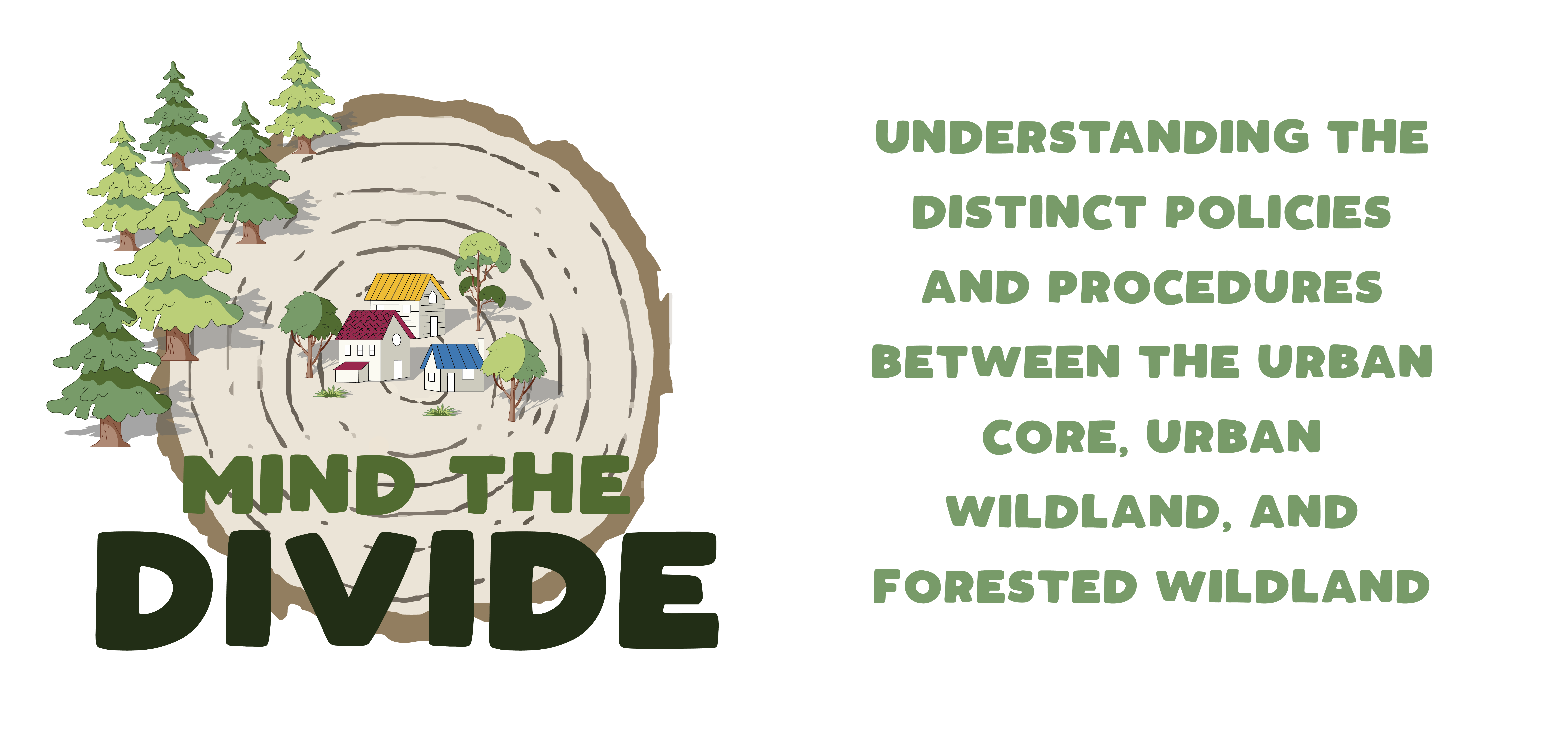Zone 9 Trees
Vitex agnus-castus
Chaste Tree
Family Verbenaceae
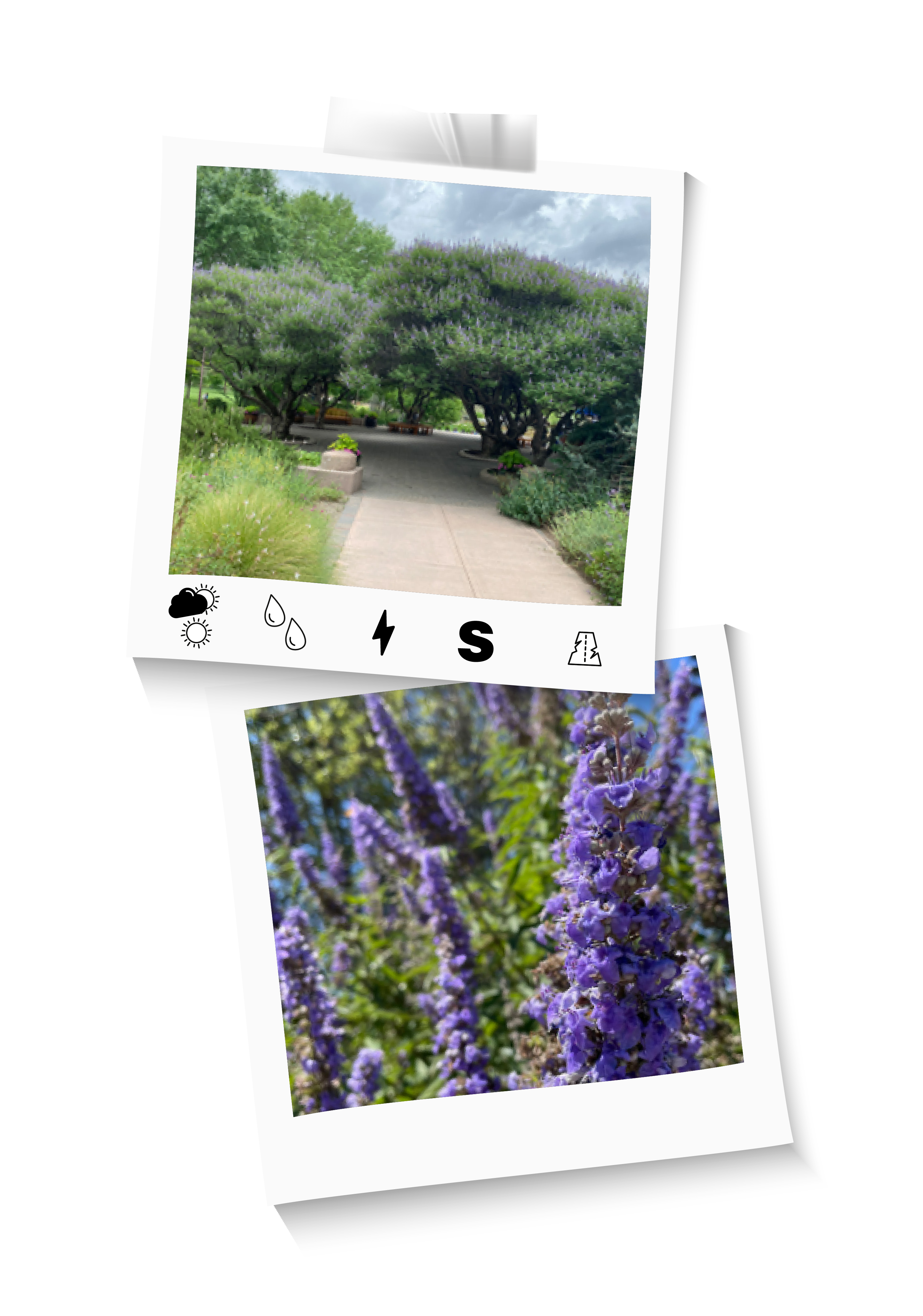
SelecTree. UFEI. “Vitex agnus-castus Tree Record.” 1995-2022. Cal Poly State University, San Luis Obispo. Accessed on Jul 19, 2022.
< https://selectree.calpoly.edu/tree-detail/1464 >
Site Conditions
- Planting area: 2’ – 5’
- Root Damage Potential: Low
- SelecTree Water Use: Low
- USDA zones: 6, 7, 8, 9, 10
- Sun exposure: Partial Shade to Full Sun
- Soil texture: Loam, Sand, or Clay
- Soil pH: Very Acidic to Very Alkaline
- Soil salinity tolerance: Good Inland
- Powerline friendly: Yes
Tree Characteristics
- Tree Shape: Rounded
- Foliage type: Deciduous
- Maximum height: 15 feet
- Canopy width: 15-20 feet
- Growth rate: ~24 in/year
- Flowers: Showy, Fragrant
- Flower color: Blue or Lavender
- Flowering: Summer or Fall
- Fruit: Small Black Drupe
- Fruiting: Summer or Fall
- Litter: Dry Fruit
Site Consideration
Streetscape, Screen, and Tree Specimen
Acca sellowiana ‘Coolidge’
Coolidge Pineapple Guava
Family Myrtaceae
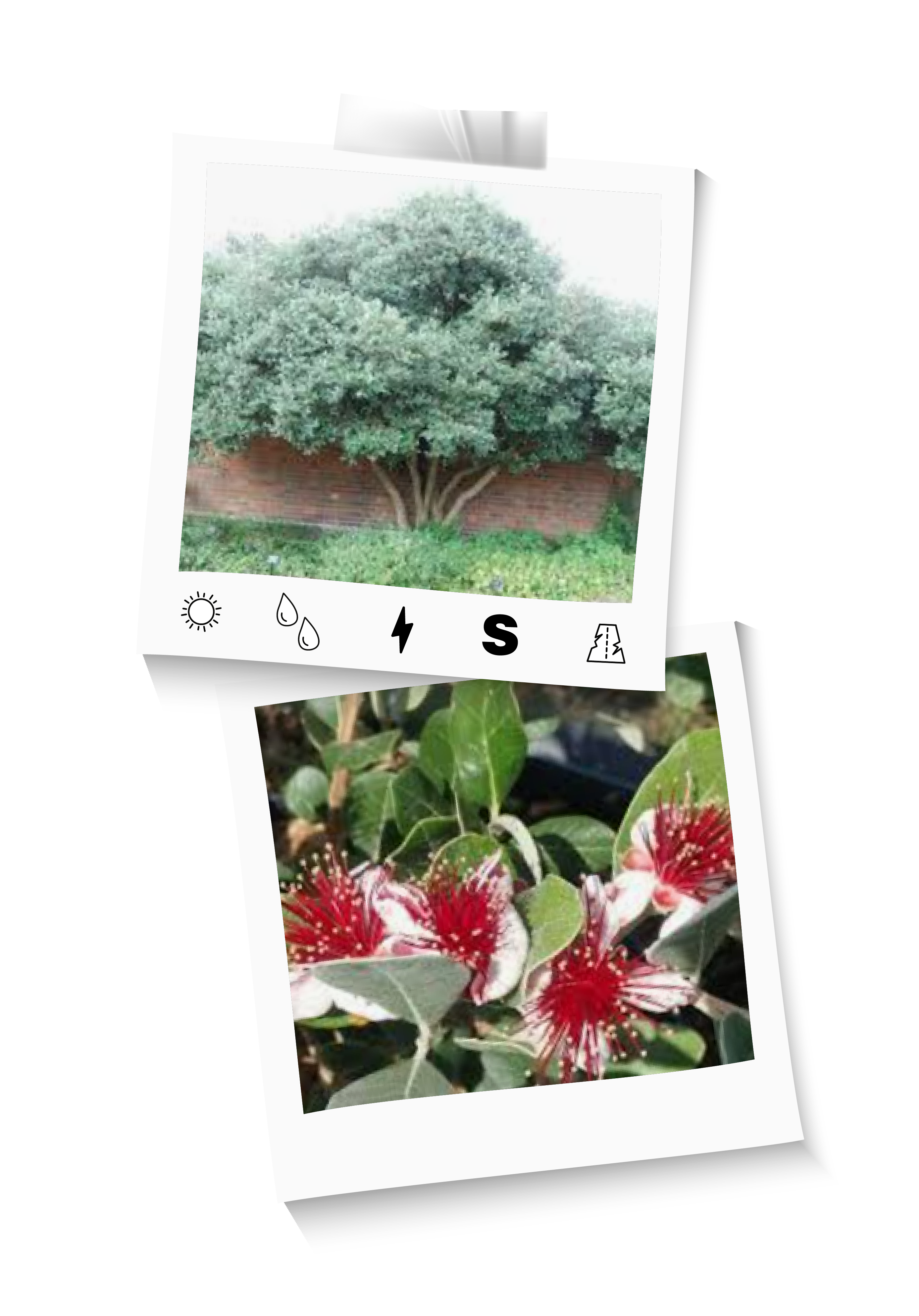
Site Conditions
- Planting area: 5’ – 10’
- Root Damage Potential: Low
- SelecTree Water Use: Low
- USDA zones: 8, 9, 10, 11
- Sun exposure: Full Sun
- Soil texture: Loam, Sand, or Clay
- Soil pH: Slightly Acidic to Very Alkaline
- Salt spray tolerance: Moderate
- Powerline friendly: Yes
Tree Characteristics
- Tree Shape: Rounded
- Foliage type: Evergreen
- Maximum height: 25 feet
- Canopy width: 18 – 25 feet
- Growth rate: ~24 in/year
- Flowers: Showy
- Flower color: Purple or Red or White
- Flowering: Spring or Summer
- Fruit: Large Gray or Green Berry
- Fruiting: Fall or Winter
- Fruit value: Edible
- Litter: Wet Fruit
Site Consideration
Hedge, Screen, and Tree
Quercus suber
Cork Oak
Family Fagaceae
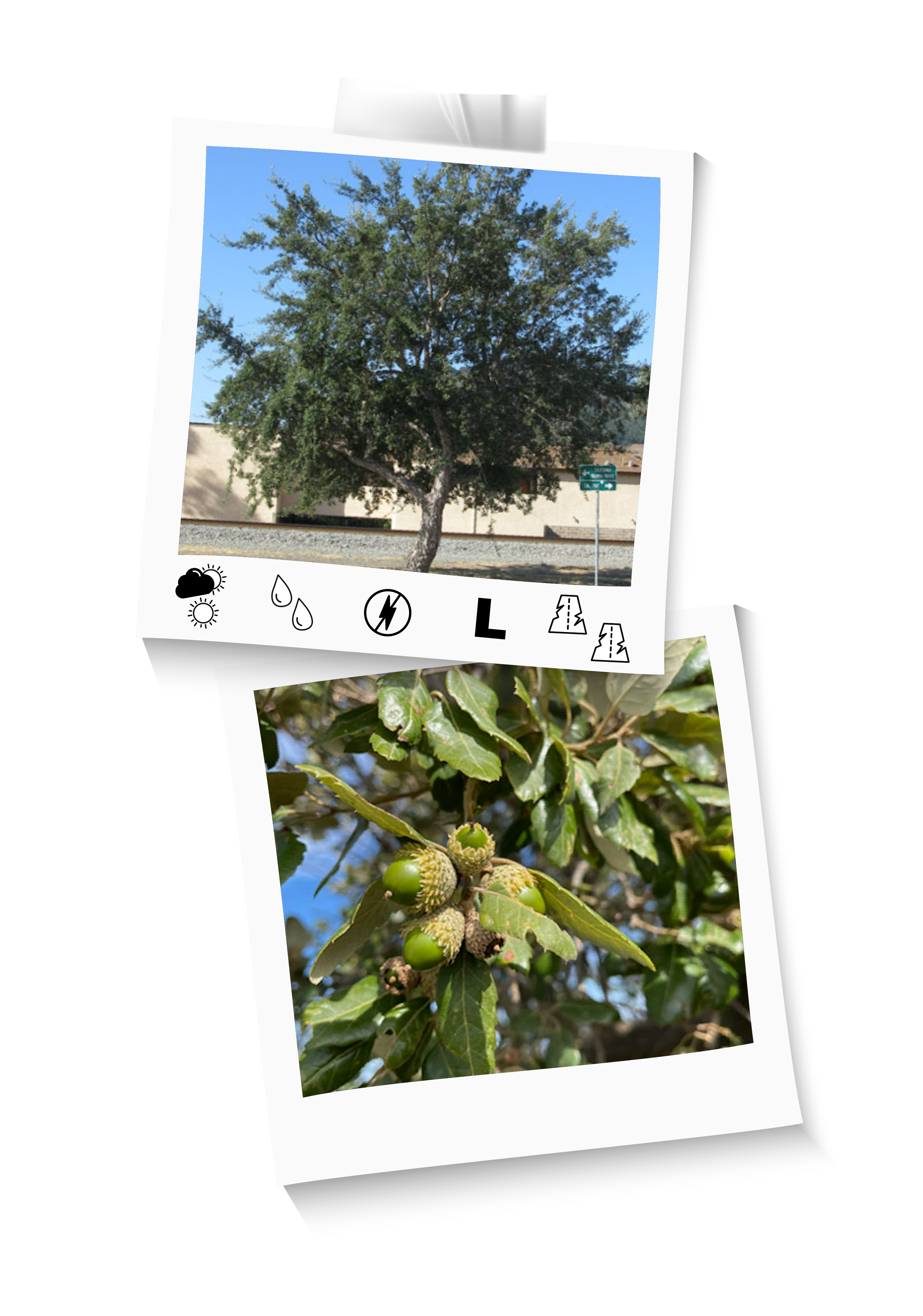
Photos taken at Cal Poly Campus – San Luis Obispo, CA, Santa Barbara, CA, Davis, CA, Sonoma, CA, Balboa Park – San Diego, CA, Sacramento, CA and Quail Arboretum – Encinitas, CA by M. Ritter, W. Mark, J. Reimer
Site Conditions
- Planting area: 10’
- Root Damage Potential : Moderate
- SelecTree Water Use: Low
- USDA zones: 8, 9, 10
- Sun exposure: Partial Shade to Full Sun
- Soil texture: Loam, Sand, or Clay
- Soil pH: Very Acidic to Very Alkaline
- Soil salinity tolerance: Moderate
- Powerline friendly: No
Tree Characteristics
- Tree Shape: Rounded
- Foliage type: Evergreen
- Maximum height: 70 feet
- Canopy width: 70 feet
- Growth rate: ~24-36 in/year
- Flowers: Inconspicuous
- Flowering: Spring
- Fruiting: Fall or Winter
- Litter: Acorn
Site Consideration
Streetscape, Tree Specimen
Cedrus deodara
Deodar Cedar
Family Pinaceae
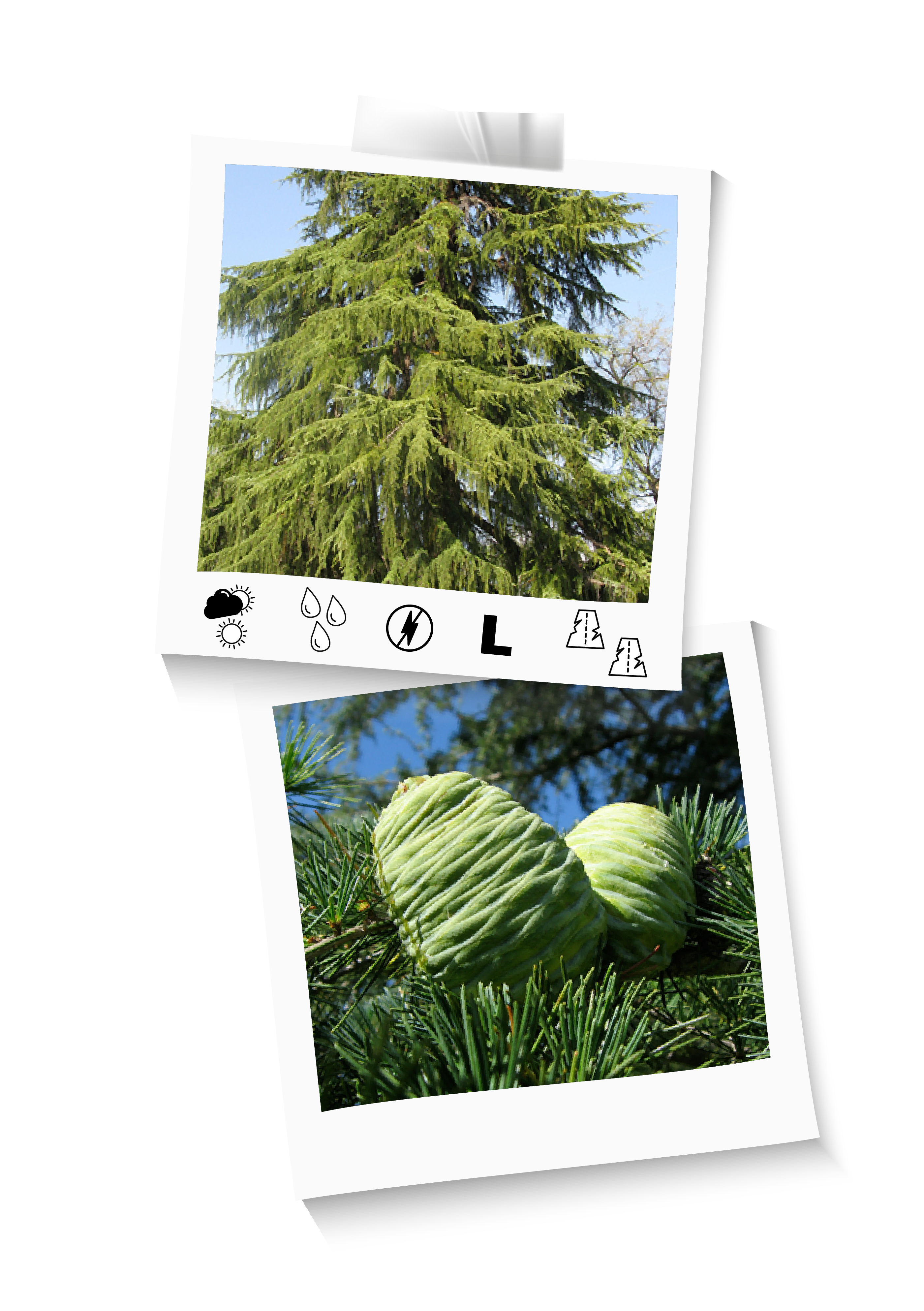
Photos taken at Fresno, CA, Huntington Botanical Gardens – San Marino, CA, Strybing Arboretum – San Francisco, CA, Bakersfield, CA, Los Altos, CA, Stanford University – Palo Alto, CA and UC Santa Cruz Arboretum – Santa Cruz, CA by M. Ritter, W. Mark, J. Reimer, C. Stubler
Site Conditions
- Planting area: 10’
- Root Damage Potential : Moderate
- SelecTree Water Use: Medium
- USDA zones: 7, 8, 9
- Sun exposure: Partial Shade to Full Sun
- Soil texture: Loam, Sand, or Clay
- Soil pH: Very Acidic to Very Alkaline
- Soil salinity tolerance: Moderate
- Powerline friendly: No
Tree Characteristics
- Tree Shape: Conical
- Foliage type: Evergreen
- Maximum height: 60 feet
- Canopy width: 20-30 feet
- Growth rate: ~36 in/year
- Flowers: Fragrant
- Flowering: Fall
- Fruiting: Spring
- Litter: Large Green and Brown Cone
Site Consideration
Parkland, Wildland, Tree Specimen
Parkinsonia x ‘Desert Museum’
Desert Museum Palo Verde
Family Fabaceae
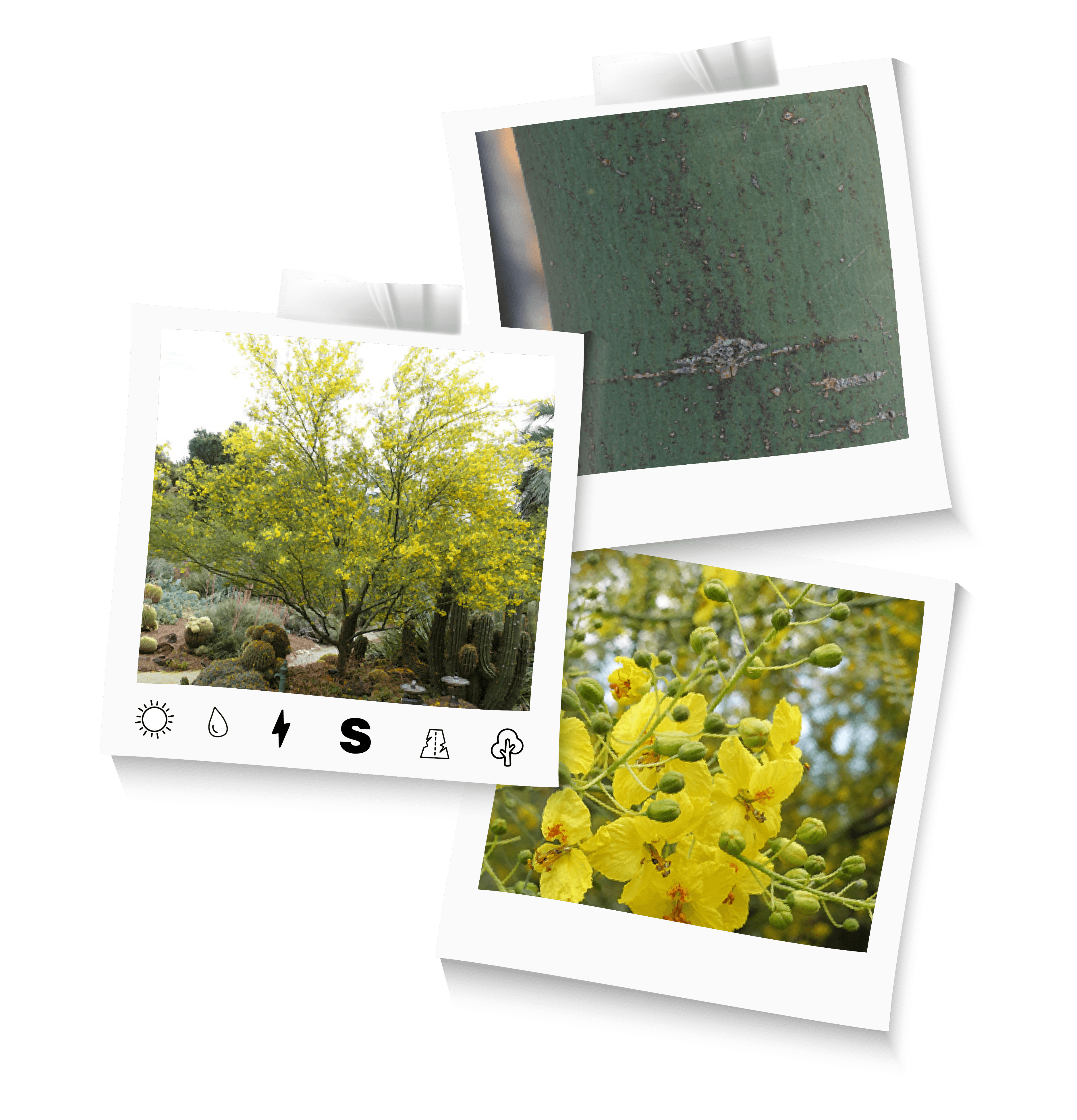
Photos taken at Pasadena, CA, Huntington Botanical Gardens – San Marino, CA, Cal Poly – San Luis Obispo, CA and UC Davis, Davis, CA by M. Ritter, J. Reimer
Site Conditions
- Planting area: 2’ – 5’
- Root Damage Potential: Low
- SelecTree Water Use: Very Low
- USDA zones: 6, 7, 8, 9
- Sun exposure: Full Sun
- Soil texture: Loam, Sand, or Clay
- Soil pH: Neutral to Very Alkaline
- Soil salinity tolerance: Inland Good
- Powerline friendly: Yes
Tree Characteristics
- Tree Shape: Rounded
- Foliage type: Deciduous
- Maximum height: 20 feet
- Canopy width: 20-25 feet
- Growth rate: ~24-36 in/year
- Flowers: Showy, Fragrant
- Flower color: Yellow
- Flowering: Spring or Summer
- Fruit: Large Brown Legume
- Fruiting: Fall
- Litter: Dry Fruit
Site Consideration
Streetscape, Screen, and Tree Specimen
Chilopsis linearis
Desert Willow
Family Bignoniaceae
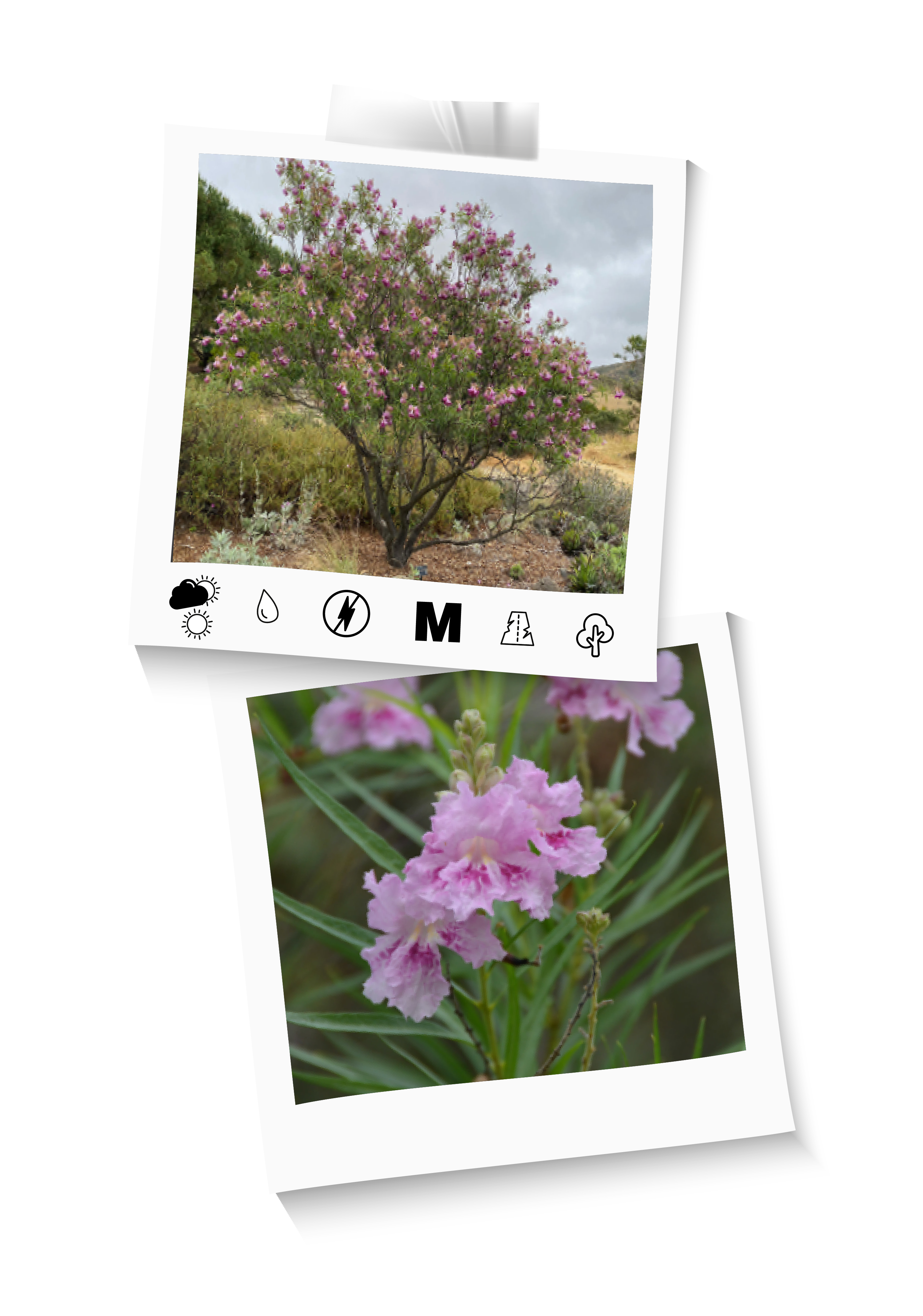
Photos taken at UC Davis – Davis, CA, Palm Springs, CA, Los Angeles County Arboretum – Arcadia, CA, Cal Poly Leaning Pine Arboretum – San Luis Obispo, CA and Albuquerque BioPark – Rio Grande Botanic Gardenby Robert O’Brien, M. Ritter, W. Mark, J. Reimer
Site Conditions
- Planting area: 2’-5’
- Root Damage Potential: Low
- SelecTree Water Use: Very Low
- USDA zones: 8, 9
- Sun exposure: Partial Shade to Full Sun
- Soil texture: Loam, Sand
- Soil pH: Neutral to Very Alkaline
- Salt spray tolerance: Low
- Powerline friendly: No
Tree Characteristics
- Tree Shape: Rounded
- Foliage type: Deciduous
- Maximum height: 30 feet
- Canopy width: 10-20 feet
- Growth rate: ~24-36 in/year
- Flowers: Showy, Fragrant
- Flower color: Purple or Pink or Red or White
- Flowering: Spring or Summer
- Fruit: Brown Capsule
- Fruiting: Fall
- Fruit value: Wildlife use it
- Litter: Dry Fruit
Lagerstroemia ‘Natchez’
Natchez Hybrid Crape Myrtle
Family Lythraceae
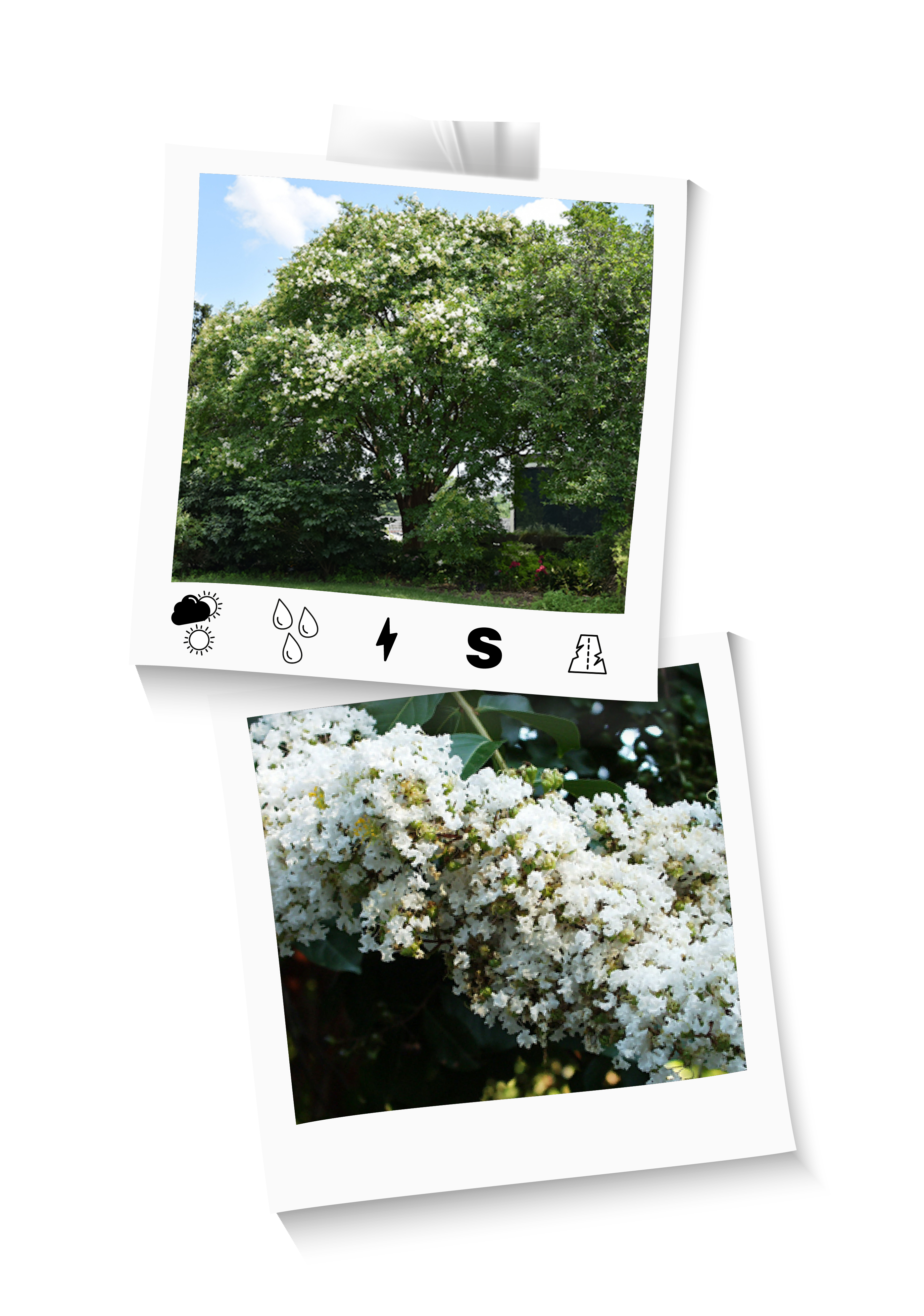
Photos taken at Dallas Arboretum – Dallas, TX, Cohn Arboretum – Baton Rouge, LA, Independence Park Botanic Garden – Baton Rouge, LA, River Banks Botanical Garden – Columbia, SC and The National Arboretum – Washington, DC by W. Mark, J. Reimer, C. Stubler
Site Conditions
- Planting area: 5’-10’
- Root Damage Potential: Low
- SelecTree Water Use: Medium
- USDA zones: 7, 8, 9, 10
- Sun exposure: Partial Shade to Full Sun
- Soil texture: Loam, Sand, or Clay
- Soil pH: Very Acidic to Slightly Alkaline
- Salt spray tolerance: Moderate
- Powerline friendly: Yes
Tree Characteristics
- Tree Shape: Rounded or Vase
- Foliage type: Deciduous
- Maximum height: 25 feet
- Canopy width: 15-25 feet
- Growth rate: ~12-24 in/year
- Flowers: Showy
- Flower color: White
- Flowering: Summer
- Litter: Dry Fruit Capsules
Site Consideration
Screen, Tree Specimen
Lagerstroemia indica ‘Powhatan’
Powhatan Crape Myrtle
Family Lythraceae
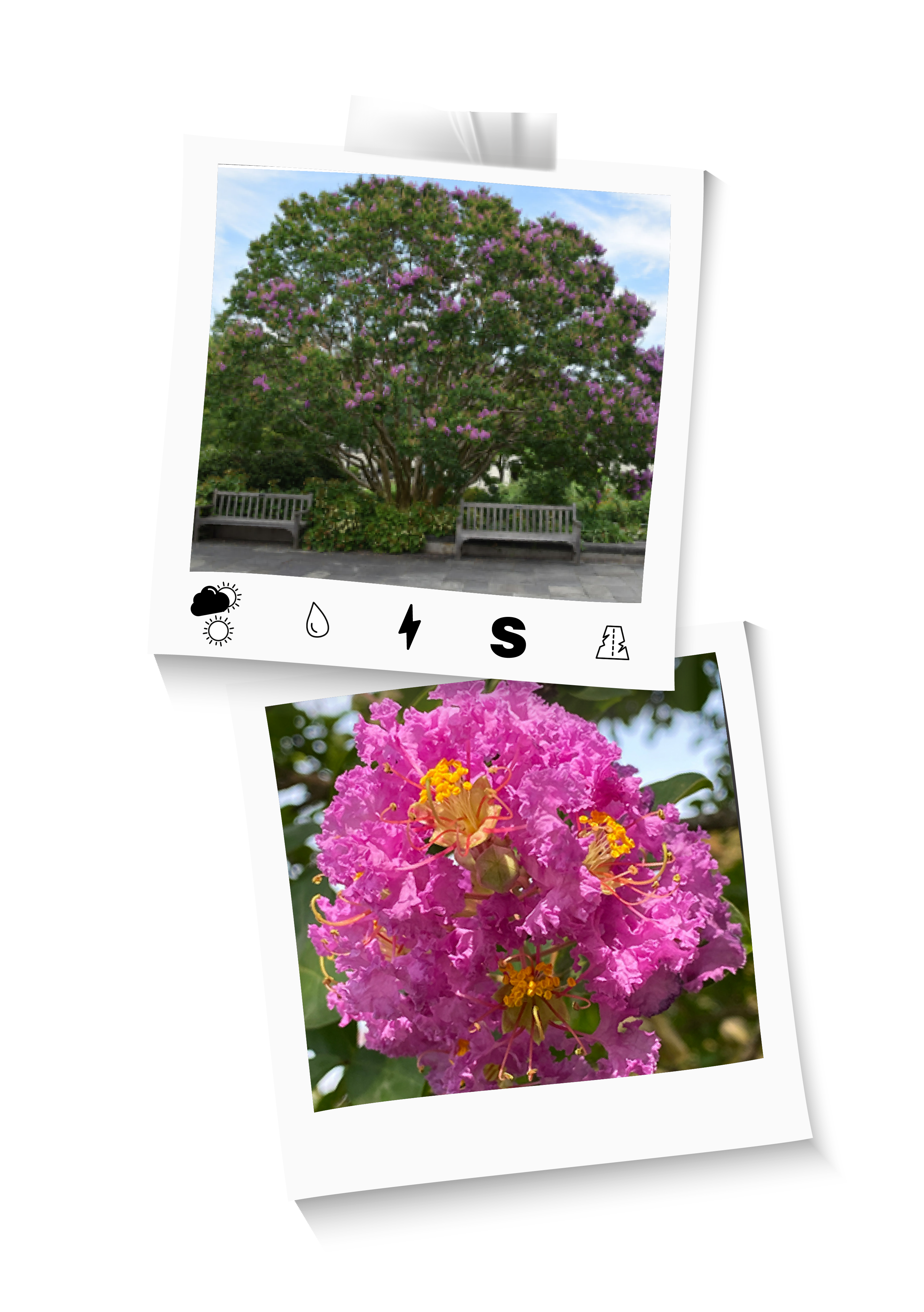
Photos taken at The National Arboretum – Washington, DC by C. Stubler, J. Reimer, W. Mark
Site Conditions
- Planting area: 2 – 5’
- Root Damage Potential: Low
- SelecTree Water Use: Very Low
- USDA zones: 7, 8, 9
- Sun exposure: Partial Shade to Full Sun
- Soil texture: Loam, Sand, or Clay
- Soil pH: Very Acidic to Slightly Alkaline
- Salt spray tolerance: Moderate
- Powerline friendly: Yes
Tree Characteristics
- Tree Shape: Rounded
- Foliage type: Deciduous
- Maximum height: 20 feet
- Canopy width: 8 – 12 feet
- Growth rate: ~24 in/year
- Flowers: Showy
- Flower color: Purple or Pink
- Flowering: Summer
- Litter: Dry Fruit Capsules
Site Consideration
Hedge, Screen, and Tree
Lagerstroemia ‘Seminole’
Seminole Crape Myrtle
Family Lythraceae
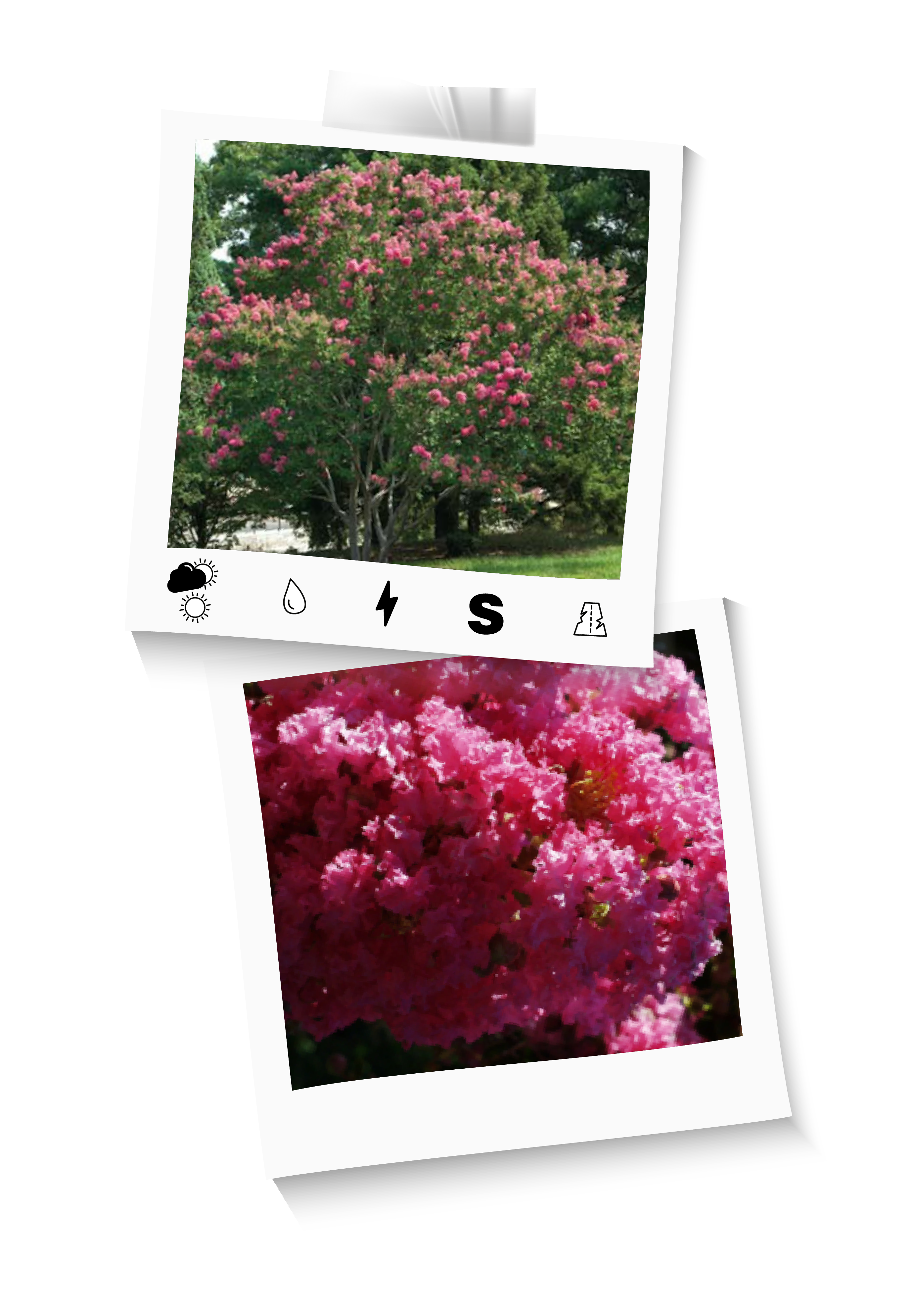
Photos taken at Independence Park Botanic Garden – Baton Rouge, LA and The National Arboretum – Washington, DC by Robert O’Brien, C. Stubler, J. Reimer, W. Mark
Site Conditions
- Planting area: 2’-5’
- Root Damage Potential: Low
- SelecTree Water Use: Very Low
- USDA zones: 7, 8, 9
- Sun exposure: Partial Shade to Full Sun
- Soil texture: Loam, Sand, or Clay
- Soil pH: Very Acidic to Slightly Alkaline
- Salt spray tolerance: Moderate
- Powerline friendly: Yes
Tree Characteristics
- Tree Shape: Rounded or Vase
- Foliage type: Deciduous
- Maximum height: 15 feet
- Canopy width: 6-15 feet
- Growth rate: ~24 in/year
- Flowers: Showy
- Flower color: Pink
- Flowering: Summer
- Litter: Dry Fruit Capsules
Site Consideration
Screen, Tree Specimen
Olea europaea ‘Swan Hill’
Swan Hill Olive
Family Oleaceae
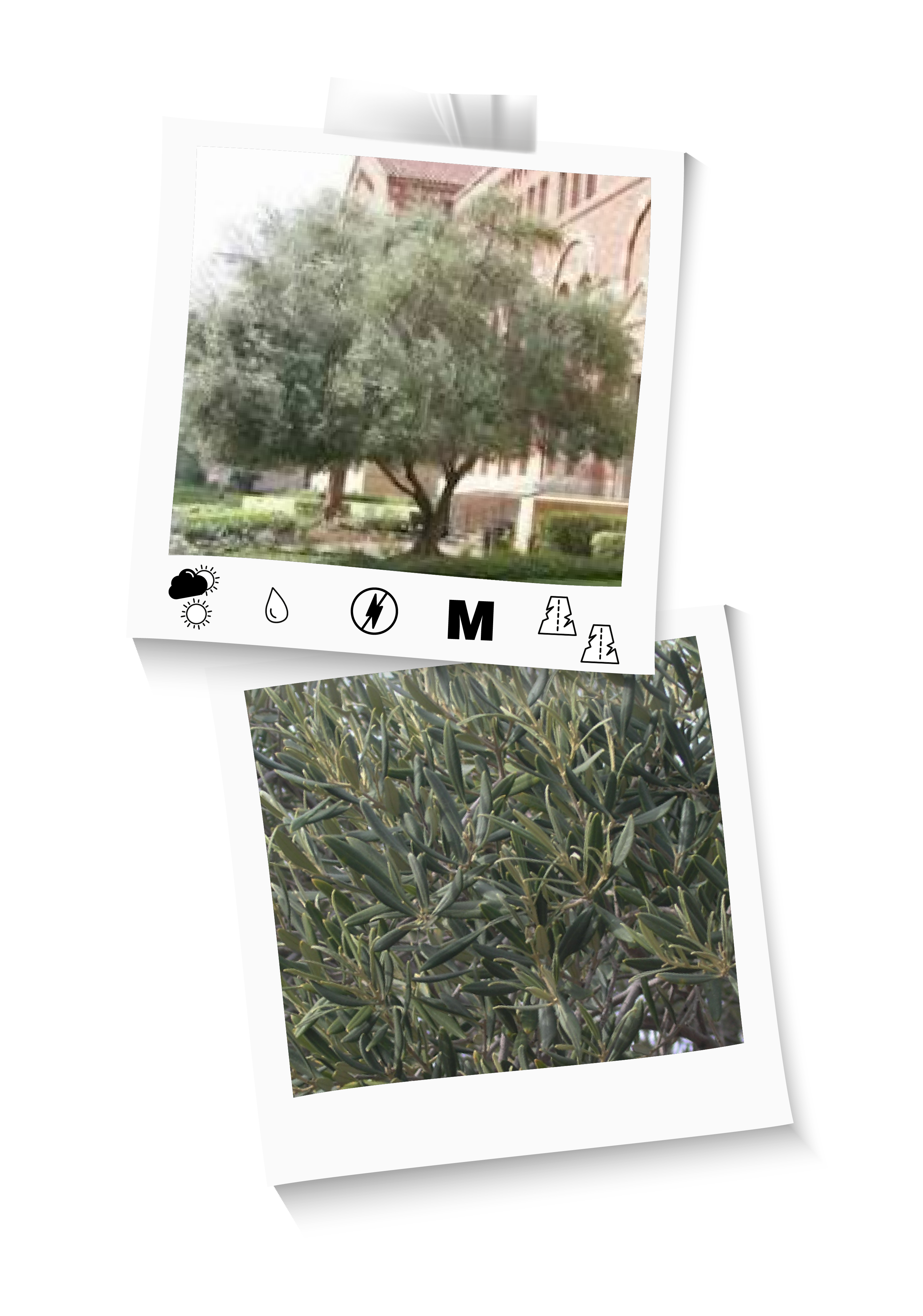
Photos taken at San Diego, City of – San Diego, CA by DeLorenzo Inc.
Site Conditions
- Planting area: 5’ – 10’
- Root Damage Potential: Moderate
- SelecTree Water Use: Low
- USDA zones: 8, 9, 10
- Sun exposure: Partial Shade to Full Sun
- Soil texture: Loam, Sand, or Clay
- Soil pH: Slightly Acidic to Very Alkaline
- Soil salinity tolerance: Coastal Moderate
- Powerline friendly: No
Tree Characteristics
- Tree Shape: Rounded
- Foliage type: Evergreen
- Maximum height: 30 feet
- Canopy width: 25 – 30 feet
- Growth rate: ~24 in/year
- Flowers: Inconspicuous
- Flowering: Spring
- Fruit: Fruitless
- Litter: Null
Site Consideration
Hedge, Screen, and Tree Specimen
Cercis occidentalis
Western Redbud
Family Fabaceae
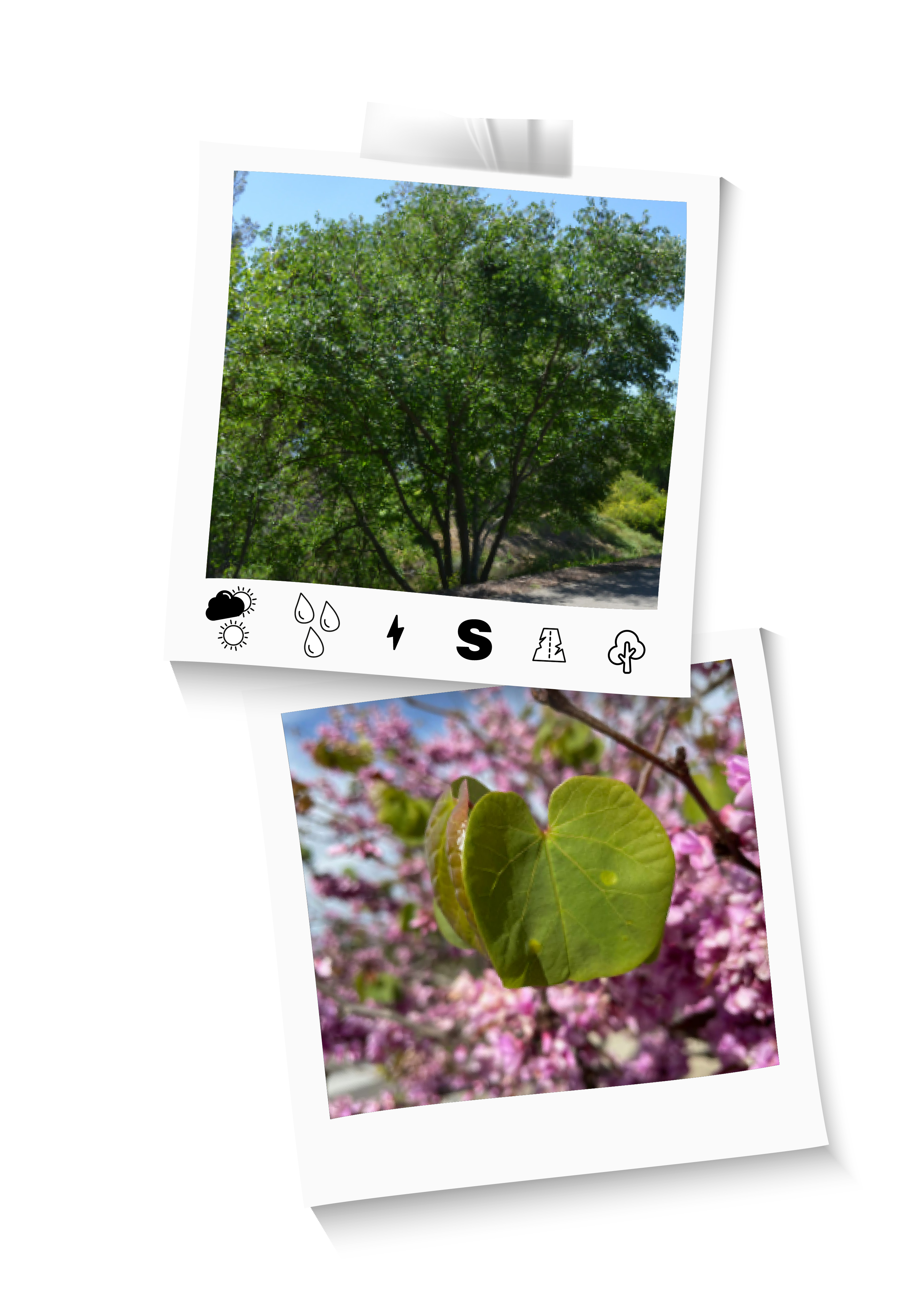
Photos taken at Leaning Pine Arboretum – Cal Poly San Luis Obispo, CA, Cal Poly State University – San Luis Obispo, CA, Santa Barbara Botanic Garden, Los Angeles County Arboretum – Arcadia, CA and UC Santa Cruz Arboretum – Santa Cruz, CA by Robert O’Brien, D. Lorenzo, J. Smith, M. Ritter, W. Mark, J. Reimer
Site Conditions
- Planting area: 2’-5’
- Root Damage Potential: Low
- SelecTree Water Use: Medium
- USDA zones: 7, 8, 9
- Sun exposure: Partial Shade to Full Sun
- Soil texture: Loam or Sand or Clay
- Soil pH: Very Acidic to Very Alkaline
- Salt spray tolerance: Moderate
- Powerline friendly: Yes
Tree Characteristics
- Tree Shape: Rounded
- Foliage type: Deciduous
- Maximum height: 20 feet
- Canopy width: 10-20 feet
- Growth rate: ~24-36 in/year
- Flowers: Showy
- Flower color: Purple
- Flowering: Spring
- Fruit: Brown Legumes
- Fruiting: Fall to Summer
- Fruit value: Wildlife use it
- Litter: Dry Fruit

